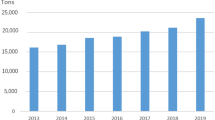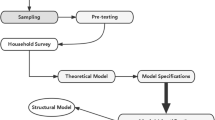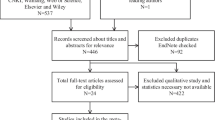Abstract
Based on expectancy valence theory, people’s behavior is affected by their self-perception and the external environment. In rural China, policy instruments as robust external environment factors have a strong effect on waste separation behavior (WSB). The purpose of the paper is to explore the influencing mechanism of policy instruments (infrastructure and information) on perceived value (perceived benefit and perceived cost) and waste separation behaviors. The data were collected from 689 rural households of Shaanxi province in China, and analyzed by using structural equation model (SEM). According to the results, the mediation effect proves that policy instruments not only can affect WSB directly but also can affect it indirectly through the perceived value. Specifically, information and infrastructure influence the perceived benefit positively and the perceived cost negatively, and information and infrastructure have an indirect effect on WSB through the mediation effect of the perceived cost. Second, policy instruments have a stronger effect on rural people’s waste separation behavior than perceived value. Specifically, infrastructure has the most important impact on waste separation behavior, followed by information and then perceived cost. Third, the perceived cost is significantly negatively related to WSB, and perceived benefit has a positive effect but is statistically insignificant. It has a practical implication for the government. Providing sufficient infrastructure and launching effective information activities could improve the perceived benefit including biospheric, egoistic, social-altruistic, and reputation; and reduce the perceived cost of time, physical, learning, and money, which could then induce rural households to engage in WSB.



Similar content being viewed by others
Notes
Published by China Environmental Protection Online at http://www.hbzhan.com
“Thirteenth Five-Year Plan” for the comprehensive improvement of rural environment issued by the Ministry of Environmental Protection and the Ministry of Finance of China in 2017.
References
Abbott A, Nandeibam S, O’Shea L (2011) Explaining the variation in household recycling rates across the UK. Ecol Econ 11:2214–2223
Andersson M, Borgstede C (2010) Differentiation of determinants of low-cost and high-cost recycling. J Environ Psychol 30:402–408
Andersson C, Stage J (2018) Direct and indirect effects of waste management policies on household waste behaviour: the case of Sweden. Waste Manag 76:19–27
Andrew A, Shasikanta N, Lucy O’S (2017) The displacement effect of convenience: the case of recycling. Ecol Econ 136:159–168
Bollen KA, Long SL (1993) Testing structural equation modeling. Newbury
Botetzagiasab I, Dimab AF, Malesiosc C (2015) Extending the theory of planned behavior in the context of recycling: the role of moral norms and of demographic predictors. Resour Conserv Recycl 95:58–67
Chan L, Bishop B (2013) A moral basis for recycling: extending the theory of planned behavior. Environ Psychol 36:96–102
Chen FY, Chen H, Yang JH, Long RY, Li WB (2019) Impact of regulatory focus on express packaging waste recycling behavior: moderating role of psychological empowerment perception. Environ Sci Pollut Res 26(9):8862–8874
Cheng QL, Wang JJ, Yin LG (2014) A research framework of green consumption behavior based on value-belief-norm theory. Adv Robot 963-965:1485–1489
Du YQ, Liu PY, Bao CK, Su SP (2016) A study on the rural environmental governance through the lens of social capital -a case of livestock farming pollution in the undeveloped region. J Public Manag 13:101–112 in China
Ellina SP, Ira I, Susi AW, IDAA W (2019) Factors influencing community participation in the management of household electronic waste in West Surabaya, Indonesia. Environ Sci Pollut Res 26:27930–27939
Fornell C, Larcker DF (1981) Structural equation models with unobservable variables and measurement error: algebra and statistics. J Mark Res 18:382–388
Granzin KL, Olsen JE (1991) Characterizing participants in activities protecting the environment: a focus on donating, recycling, and conservation behaviors. J Public Policy Mark 10:1–27
Grodzińska-Jurczak M, Tomal P, Tarabuła-Fiertak M, Nieszporek K, Read AD (2006) Effects of an educational campaign on public environmental attitudes and behavior in Poland. Resour Conserv Recycl 46:182–197
Heidari A, Kolahi M, Behravesh N, Ghorbanyon M, Ehsanmansh F, Hashemolhosini N, Zanganeh F (2018) Youth and sustainable waste management: a SEM approach and extended theory of planned behavior. J Mater Cycles Waste Manag 20:1–13
Iyer ES, Kashyap RK (2007) Consumer recycling: role of incentives, information, and social class. J Consum Behav 6:32–47
Jakovcevic A, Steg L (2013) Sustainable transportation in Argentina: values, beliefs, norms and car use reduction. Transp. Res Part F 20:70–79
Judith IMG, Linda S (2008) Value orientations to explain beliefs related to environmental significant behavior how to measure egoistic, altruistic, and biospheric value orientations. Environ Behav 40:330–354
Kemp R, Pontoglio S (2011) The innovation effects of environmental policy instruments — a typical case of the blind men and the elephant? Ecol Econ 72:28–36
Kilbourne W, Pickett G (2008) How materialism affects environmental beliefs, concern, and environmentally responsible behavior. J Bus Res 61:885–893
Knussen C, Yule F, MacKenzie J, Wells M (2004) An analysis of intentions to recycle household waste: the roles of past behavior, perceived habit, and perceived lack of facilities. J Environ Psychol 24:237–246
Le TTL, Hisako N, Yoshifumi T, Mitsuyasu Y (2017) Psychological driving forces behind households’ behaviors toward municipal organic waste separation at source in Vietnam: a structural equation modeling approach. J Mater Cycles Waste Manag 19:1052–1060
Lee M, Choi H, Koo Y (2017) Inconvenience cost of waste disposal behavior in South Korea. Ecol Econ 140:58–65
Liao C, Zhao D, Zhang S, Chen L (2018) Determinants and the moderating effect of perceived policy effectiveness on residents’ separation intention for rural household solid waste. Int J Environ Res Public Health 15:726
Lin BC, Zheng SQ, Ankinée K (2016) One without the other? Behavioural and incentive policies for household waste management. J Econ Surv 30:526–551
Mak TMW, Yu IKM, Wang L, Hsu SC, Tsang DCW, Li CN, Yeung TLY, Zhang R, Poon CS (2019) Extended theory of planned behaviour for promoting construction waste recycling in Hong Kong. Waste Manag 83:161–170
Malik NKA, Abdullah SH, Manaf LA (2015) Community participation on solid waste segregation through recycling programmes in Putrajaya. Procedia Environ Sci 30:10–14
Moustaki I, Joreskog KG, Mavridis D (2014) Factor models for ordinal variables with covariate effects on the manifest and latent variables: a comparison of LISREL and IRT approaches. Struct Equ Modeling 11(4):487–513
Oreg S, Tally KG (2006) Predicting pro-environmental behavior cross-nationally: values, the theory of planned behavior, and taxes value-belief-norm theory. Environ Psychol Nonverbal Behav 38:462–483
Örjan W (1998) The new environmental paradigm and personal norms. Environ Psychol Nonverbal Behav 30:75–100
Oskamp S, Harrington MJ, Edwards TC, Sherwood DL, Okuda SM, Swanson DC (1991) Factors influencing household recycling behavior. Environ Behav 23:494–519
Paula V, Elizabeth R (2008) Factors influencing households’ participation in recycling. Waste Manage Res 26:140–146
Petrick JF (2002) Development of a multi-dimensional scale for measuring the perceived value of a service. J Leis Res 34:119
Saphores JDM, Ogunseitan OA, Shapiro AA (2012) Willingness to engage in a pro-environmental behavior: an analysis of e-waste recycling based on a national survey of U.S. households. Resour Conserv Recycl 60:49–63
Sidique SF, Joshi SV, Lupi F (2010) Factors influencing the rate of recycling: an analysis of Minnesota counties. Resour Conserv Recycl 54:242–249
Stern PC (2000) New environmental theories: toward a coherent theory of environmental significant behavior. J Soc Issues 56:407–424
Tang L, Luo XF, Zhang JB (2019) Social supervison, group identity and farmers’ domestic waste centralized disposal behavior: an analysis based on mediation effect and regulation effect of the face concept. China Rural Survey 2:18–33 in China
Viscusi WK, Huber J, Bell J (2011) Promoting recycling: private values, social norms, and economic incentives. Am Econ Rev 101:65–70
Wan C, Sheng QP, Yu A (2015) Key determinants of willingness to support policy measures on recycling: a case study in Hong Kong. Environ Sci Pol 54:409–418
Wan C, Shen G, Choi S (2017) An indirect pro-environmental behavior: public support for waste management policy. Waste Manag 69:1–2
Wan C, Shen GQP, Choi S (2018) Differential public support for waste management policy: the case of Hong Kong. J Clean Prod 75:477–488
Wang SY, Wang JP, Zhao SL, Yang S (2019) Information publicity and resident’s waste separation behavior: an empirical study based on the norm activation model. Waste Manag 87:33–42
Wong NWM (2018) Electronic waste governance under “one country, two systems”: Hong Kong and mainland China. Int J Environ Res Public Health 15:2347
Xu L, Zhang XL, Ling ML (2018) Pro-environmental spillover under environmental appeals and monetary incentives: evidence from an intervention study on household waste separation. J Environ Psychol 60:27–33
Yukalang N, Clarke B, Ross K (2018) Solid waste management solutions for a rapidly urbanizing area in Thailand: recommendations based on stakeholder input. Int J Environ Res Public Health 15:1302
Funding
This research was funded by the Shaanxi Science and Technology Department, general items of Shaanxi Soft Science (2019KRM177), and the National Natural Science Foundation of China (Grant No.71773094).
Author information
Authors and Affiliations
Contributions
Ying Ma contributed to paper designing, collecting, and analyzing the questionnaire; Huiling Wang contributed to data collecting and analysis; and Rong Kong contributed to the paper revisions.
Corresponding author
Ethics declarations
Conflict of interest
The authors declare that they have no conflict of interest.
Additional information
Responsible editor: Baojing Gu
Publisher’s note
Springer Nature remains neutral with regard to jurisdictional claims in published maps and institutional affiliations.
Appendix
Appendix
Rights and permissions
About this article
Cite this article
Ma, Y., Wang, H. & Kong, R. The effect of policy instruments on rural households’ solid waste separation behavior and the mediation of perceived value using SEM. Environ Sci Pollut Res 27, 19398–19409 (2020). https://doi.org/10.1007/s11356-020-08410-2
Received:
Accepted:
Published:
Issue Date:
DOI: https://doi.org/10.1007/s11356-020-08410-2




